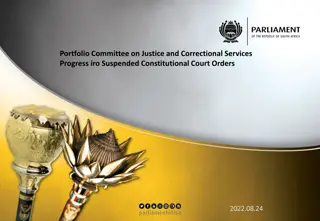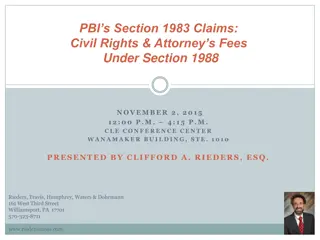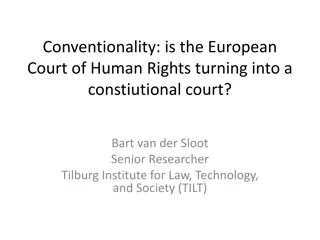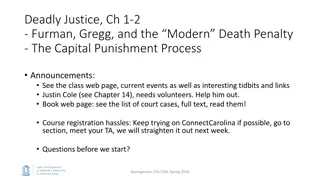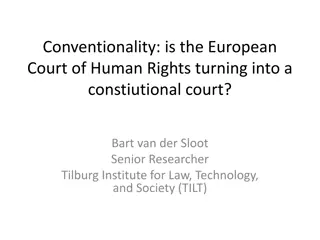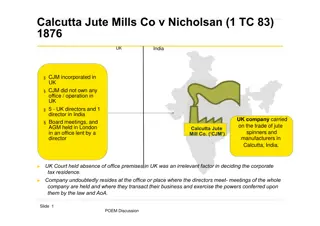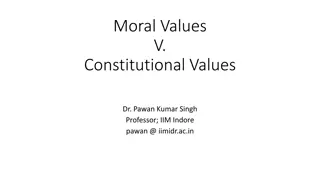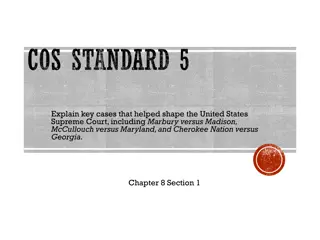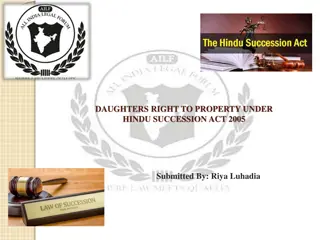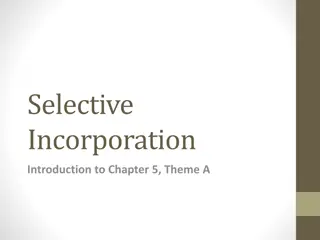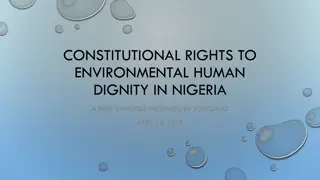Evolution of Constitutional Rights in Landmark Cases
The excerpt discusses significant Supreme Court cases such as Gitlow v. New York (1925), West Coast Hotel v. Parrish (1937), and United States v. Carolene Products Co. (1938) that shaped the interpretation of constitutional rights, including freedom of speech, due process, and regulation of commerce. It emphasizes the balance between individual liberties and the government's power to protect public welfare and maintain social order.
Download Presentation

Please find below an Image/Link to download the presentation.
The content on the website is provided AS IS for your information and personal use only. It may not be sold, licensed, or shared on other websites without obtaining consent from the author.If you encounter any issues during the download, it is possible that the publisher has removed the file from their server.
You are allowed to download the files provided on this website for personal or commercial use, subject to the condition that they are used lawfully. All files are the property of their respective owners.
The content on the website is provided AS IS for your information and personal use only. It may not be sold, licensed, or shared on other websites without obtaining consent from the author.
E N D
Presentation Transcript
Gitlow v. New York (1925) For present purposes, we may and do assume that freedom of speech and of the press which are protected by the First Amendment from abridgment by Congress are among the fundamental personal rights and "liberties" protected by the due process clause of the Fourteenth Amendment from impairment by the States . . . That a State in the exercise of its police power may punish those who abuse this freedom by utterances inimical to the public welfare, tending to corrupt public morals, incite to crime, or disturb the public peace, is not open to question . . . And, for yet more imperative reasons, a State may punish utterances endangering the foundations of organized government and threatening its overthrow by unlawful means. These imperil its own existence as a constitutional State.
West Coast Hotel v. Parrish (1937) The constitutional provision invoked is the due process clause of the Fourteenth Amendment governing the states, as the due process clause invoked in the Adkins Case governed Congress. In each case the violation alleged by those attacking minimum wage regulation for women is deprivation of freedom of contract. What is this freedom? The Constitution does not speak of freedom of contract. It speaks of liberty and prohibits the deprivation of liberty without due process of law. In prohibiting that deprivation, the Constitution does not recognize an absolute and uncontrollable liberty. Liberty in each of its phases has its history and connotation. But the liberty safeguarded is liberty in a social organization which requires the protection of law against the evils which menace the health, safety, morals, and welfare of the people. Liberty under the Constitution is thus necessarily subject to the restraints of due process, and regulation which is reasonable in relation to its subject and is adopted in the interests of the community is due process . . . We think that the views thus expressed are sound and that the decision in the Adkins Case was a departure from the true application of the principles governing the regulation by the state of the relation of employer and employed.
United States v. Carolene Products Co. (1938) . . . we might rest decision wholly on the presumption of constitutionality. But affirmative evidence also sustains the statute . . . Congress is free to exclude from interstate commerce articles whose use in the states for which they are destined it may reasonably conceive to be injurious to the public health, morals or welfare . . . or which contravene the policy of the state of their destination. 4.There may be narrower scope for operation of the presumption of constitutionality when legislation appears on its face to be within a specific prohibition of the Constitution, such as those of the first ten amendments, which are deemed equally specific when held to be embraced within the Fourteenth. It is unnecessary to consider now whether legislation which restricts those political processes which can ordinarily be expected to bring about repeal of undesirable legislation is to be subjected to more exacting judicial scrutiny under the general prohibitions of the Fourteenth Amendment than are most other types of legislation . . . Nor need we enquire whether similar considerations enter into the review of statutes directed at particular religious, or national, or racial minorities: whether prejudice against discrete and insular minorities may be a special condition, which tends seriously to curtail the operation of those political processes ordinarily to be relied upon to protect minorities, and which may call for a correspondingly more searching judicial inquiry.
Hirabiyashi v. United States (1943) The war power of the national government is the power to wage war successfully. The power is not restricted to the winning of victories in the field and the repulse of enemy forces. It embraces every phase of the national defense . . . There is support for the view that social, economic and political conditions which have prevailed since the close of the last century, when the Japanese began to come to this country in substantial numbers, have intensified their solidarity and have in large measure prevented their assimilation as an integral part of the white population . . . Viewing these data in all their aspects, Congress and the Executive could reasonably have concluded that these conditions have encouraged the continued attachment of members of this group to Japan and Japanese institutions.
EXECUTIVE ORDER 9066 February 19, 1942 Whereas, the successful prosecution of the war requires every possible protection against espionage and against sabotage to national-defense material, national-defense premises and national defense utilities . . . Now therefore, by virtue of the authority vested in me as President of the United States, and Commander in Chief of the Army and Navy, I hereby authorize and direct the Secretary of War, and the Military Commanders whom he may from time to time designate, whenever he or any designated Commander deems such action to be necessary or desirable, to prescribe military areas in such places and of such extent as he or the appropriate Military Commander may determine, from which any or all persons may be excluded, and with respect to which, the right of any persons to enter, remain in, or leave shall be subject to whatever restriction the Secretary of War or the appropriate Military Commander may impose in his discretion.
Korematsu v. United States (1944) It should be noted, to begin with, that all legal restrictions which curtail the civil rights of a single racial group are immediately suspect. That is not to say that all such restrictions are unconstitutional. It is to say that courts must subject them to the most rigid scrutiny . . . To cast this case into outlines of racial prejudice, without reference to the real military dangers which were presented, merely confuses the issue. Korematsu was not excluded from the Military Area because of hostility to him or his race. He was excluded because we are at war with the Japanese Empire, because the properly constituted military authorities feared an invasion of our West Coast and felt constrained to take proper security measures, because they decided that the military urgency of the situation demanded that all citizens of Japanese ancestry be segregated from the West Coast temporarily, and, finally, because Congress, reposing its confidence in this time of war in our military leaders -- as inevitably it must -- determined that they should have the power to do just this. There was evidence of disloyalty on the part of some, the military authorities considered that the need for action was great, and time was short. We cannot -- by availing ourselves of the calm perspective of hindsight -- now say that, at that time, these actions were unjustified.
KorematsuMurphy dissent This exclusion of all persons of Japanese ancestry, both alien and non- alien, from the Pacific Coast area on a plea of military necessity in the absence of martial law ought not to be approved. Such exclusion goes over the very brink of constitutional power, and falls into the ugly abyss of racism . . . Justification for the exclusion is sought, instead, mainly upon questionable racial and sociological grounds not ordinarily within the realm of expert military judgment, supplemented by certain semi-military conclusions drawn from an unwarranted use of circumstantial evidence . . . I dissent, therefore, from this legalization of racism. Racial discrimination in any form and in any degree has no justifiable part whatever in our democratic way of life. It is unattractive in any setting, but it is utterly revolting among a free people who have embraced the principles set forth in the Constitution of the United States.
KorematsuJackson dissent A judicial construction of the due process clause that will sustain this order is a far more subtle blow to liberty than the promulgation of the order itself. A military order, however unconstitutional, is not apt to last longer than the military emergency. Even during that period, a succeeding commander may revoke it all. But once a judicial opinion rationalizes such an order to show that it conforms to the Constitution, or rather rationalizes the Constitution to show that the Constitution sanctions such an order, the Court for all time has validated the principle of racial discrimination in criminal procedure and of transplanting American citizens. The principle then lies about like a loaded weapon, ready for the hand of any authority that can bring forward a plausible claim of an urgent need. Every repetition imbeds that principle more deeply in our law and thinking and expands it to new purposes. All who observe the work of courts are familiar with what Judge Cardozo described as the tendency of a principle to expand itself to the limit of its logic. A military commander may overstep the bounds of constitutionality, and it is an incident. But if we review and approve, that passing incident becomes the doctrine of the Constitution. There it has a generative power of its own, and all that it creates will be in its own image. Nothing better illustrates this danger than does the Court's opinion in this case.
Missouri ex rel Gaines v. Canada (1938, 6-2 decision) In answering petitioner's contention that this discrimination constituted a denial of his constitutional right, the state court has fully recognized the obligation of the State to provide negroes with advantages for higher education substantially equal to the advantages afforded to white students. The State has sought to fulfill that obligation by furnishing equal facilities in separate schools, a method the validity of which has been sustained by our decisions The basic consideration is not as to what sort of opportunities other States provide, or whether they are as good as those in Missouri, but as to what opportunities Missouri itself furnishes to white students and denies to negroes solely upon the ground of color. The admissibility of laws separating the races in the enjoyment of privileges afforded by the State rests wholly upon the equality of the privileges which the laws give to the separated groups within the State.
Pre-Brown key civil rights cases 1. Smith v. Allwright(1944): abolition of all-white primaries 2. Shelley v. Kramer (1948): courts can t enforce racial covenants in house sales 3. Sweatt v. Painter (1950): separate law schools for blacks and whites unconstitutional 4. McLaurin v. Oklahoma (1950): separate graduate programs for blacks and whites unconstitutional
Brown v. Board of Education (1954, unanimous decision) Does segregation of children in public schools solely on the basis of race, even though the physical facilities and other tangible factors may be equal, deprive the children of the minority group of equal educational opportunities? We believe that it does... Segregation of white and colored children in public schools has a detrimental effect upon the colored children. The impact is greater when it has the sanction of the law, for the policy of separating the races is usually interpreted as denoting the inferiority of the negro group... We conclude that, in the field of public education, the doctrine of separate but equal has no place. Separate educational facilities are inherently unequal. Therefore, we hold that the plaintiffs and others similarly situated for whom the actions have been brought are, by reason of the segregation complained of, deprived of the equal protection of the laws guaranteed by the Fourteenth Amendment.
Cooper v. Aaron (1958) Opinion of the Court by THE CHIEF JUSTICE, MR. JUSTICE BLACK, MR. JUSTICE FRANKFURTER, MR. JUSTICE DOUGLAS, MR. JUSTICE BURTON, MR. JUSTICE CLARK, MR. JUSTICE HARLAN, MR. JUSTICE BRENNAN, and MR. JUSTICE WHITTAKER. As this case reaches us, it raises questions of the highest importance to the maintenance of our federal system of government. It necessarily involves a claim by the Governor and Legislature of a State that there is no duty on state officials to obey federal court orders resting on this Court's considered interpretation of the United States Constitution. Specifically, it involves actions by the Governor and Legislature of Arkansas upon the premise that they are not bound by our holding in Brown v. Board of Education. That holding was that the Fourteenth Amendment forbids States to use their governmental powers to bar children on racial grounds from attending schools where there is state participation through any arrangement, management, funds or property. We are urged to uphold a suspension of the Little Rock School Board's plan to do away with segregated public schools in Little Rock until state laws and efforts to upset and nullify our holding in Brown v. Board of Education have been further challenged and tested in the courts. We reject these contentions.


![❤[PDF]⚡ Apollo Mission Control: The Making of a National Historic Landmark (Spr](/thumb/21551/pdf-apollo-mission-control-the-making-of-a-national-historic-landmark-spr.jpg)





